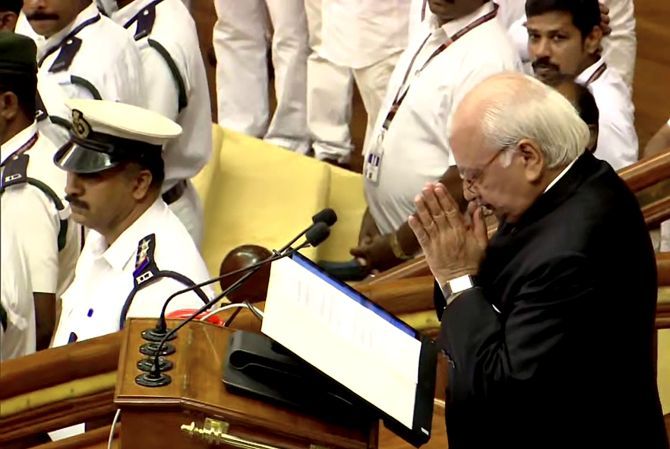What does a Muslim in politics do? Where does he go? asks Aditi Phadnis.

'Don't use words like "Hindu" and "Muslim",' Kerala Governor Arif Mohammad Khan reproved anchor Rajdeep Sardesai.
'You don't know how much damage these words can do.'
To many, it was a bit rich.
He's done well for himself using exactly those two words.
Here is a brief history of Khan's politics.
Khan was the minister for energy in Rajiv Gandhi's government when the Shah Bano debate (1986) was on and he became known as a crusader for the rights of Muslim women by asking his party to define Islamic law in the light of contemporary reality and accept the Supreme Court verdict instead of going by the interpretation of the orthodoxy.
When the Congress equivocated on the issue, Khan resigned.
When V P Singh's Jan Morcha was formed in 1987, Khan was in the forefront, later becoming the Cabinet minister for energy when V P Singh became the prime minister.
He also testified in the St Kitts forgery case.
His statement had the effect of tightening the noose around Chandraswami's neck, charged by the Central Bureau of Investigation with forging papers about the account to tarnish V P Singh's image.
When the V P Singh government fell, he waited before joining the Bahujan Samaj Party.
He lost little time in deposing before the Jain Commission by attesting that the V P Singh government had never discussed in Cabinet meetings the question of Rajiv Gandhi's security (implying Gandhi's assassination was the result of a security lapse).
V P Singh attributed his testimony to a 'failure of Mr Arif Mohammad Khan's memory'.
But Congress doors remained shut to him because of a cabal of Muslim leaders there.
What about the BSP? Couldn't that have been a route to Muslim politics? Khan tried that as well.
But he resigned from the BSP when it decided to share power with the BJP in Uttar Pradesh.
At that time, his logic was that he did not want to be treated as a tradeable commodity.
Khan joined the BJP in 2004.
His justification was that the Congress was as communal as any other party: After the Gujarat riots, he and Ram Vilas Paswan asked the Congress for a few seats, any seats, even the weakest, to fight communal elements in Gujarat.
The Congress refused to give him a single seat.
He contested as a BJP Lok Sabha candidate in 2004, but lost.
And then he left the BJP in 2007 to go into a spell of hibernation, only to come out and become governor of Kerala in September last year.
His explanation for supporting the BJP is that it is fighting Islamic orthodoxy and anyone who does that must be strengthened.
But his views on a Hindu Rashtra have never been clearly articulated.
In a recent interview, supporting the government's move on Article 370, Khan said he was against any 'special power' to the state, but firmly supported 'greater federal powers' to states.
The fact is, Khan's dilemma is actually the dilemma of the Muslim political leadership in India.
A modern Muslim in the Congress runs the risk of becoming a symbol of tokenism.
In the BSP, he stands reduced to being a mindless deliverer of a vote bank subject to the caprice of one leader.
And in the BJP, he is viewed at best with incomprehension, at worst with suspicion.
What does a Muslim in politics do? Where does he go?
Khan and others like him were, for some time, consumed with the same question: Why is it that an assertion by the Muslim community always ends up strengthening the conservatives? Sir Syed Ahmad Khan and Maulana Azad faced similar crises.
Sir Syed, who espoused a modern Western education for the Muslims, was viewed with suspicion by sections in the Congress for his 'loyalty' to the British and detestation by the orthodoxy in his own community for selling out on his commitment to Islam.
Maulana Azad represented another irony of Indian history -- while possessing a thorough Islamic training, he ended up espousing a secular vision of nationalism, informed by personal religious sensibilities.
On the other hand, his opponent Mohammad Ali Jinnah, a modernist with a minimal religious upbringing, ended up vying for a separate Muslim State, informed by purely political considerations.
Azad had to resign from the presidentship of the Congress to allow that party to try to bridge the breach between it and the Muslim League and limit the damage from the imminent danger of Partition.
He paid the price for his liberal political beliefs as the Congress tried to run with the hare and hunt with the hounds.
Arif Mohammad Khan aspired to become India's model modern Muslim leader.
All he's managed to do is become governor of Kerala.











